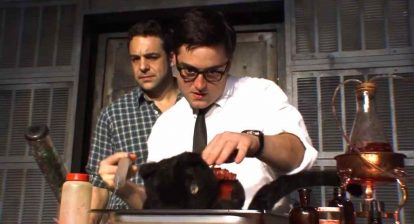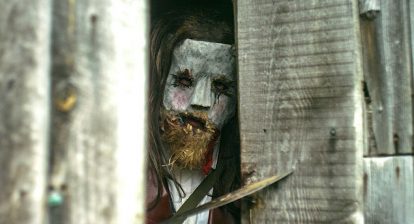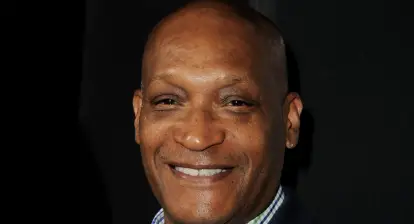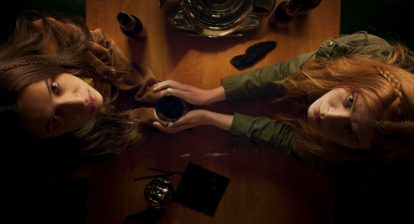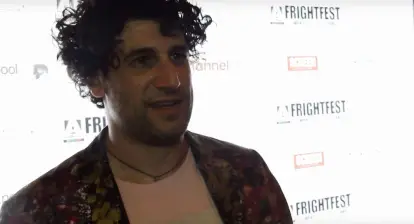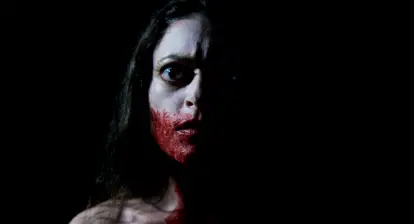Fans of horror anthologies should be on the lookout for the upcoming release from filmmaker and author Keith Hopkins. His book, set to release on October 27, is titled The Horror Anthology Handbook. It features interviews with multiple horror anthology filmmakers as well as a detailed history of films and shows.
Hopkins is the director of the recently released horror anthology Gravedigger Dave’s Halfway House. When he set out to direct a horror anthology, he searched for a book on the topic, but none could be found. This is what inspired him to write the handbook, which provides a wealth of information on this type of film. While the book is geared toward filmmakers, general horror fans will find it informative and will likely walk away with a list of must-see films and series. We recently spoke to Keith about his inspirations, the writing and filmmaking process, and his upcoming projects.

WICKED HORROR: Congratulations on the upcoming release of The Horror Anthology Handbook! I had the opportunity to read the manuscript, and I really enjoyed it. I love how you likened anthologies to storytelling around the campfire and draw the reader in by discussing some of your first experiences with these stories. Was there a particular film or story that sparked your love of horror at a young age?
KEITH HOPKINS: Thank you! In keeping with the campfire theme, one of the productions that sparked my love of horror was definitely, Are You Afraid of the Dark? To this day I think it has one of the creepiest opening sequences. The music combined with the shot of the abandoned boat gives me chills every time. As it was a show for kids, they were never able to fall back on gore or exploitation to shock the audience. They had to rely on good writing, and I think that’s why the show holds up so well.
WICKED HORROR: Continuing on that same note, I think readers will be interested to know which films and industry veterans inspired you to purse filmmaking. Aside from anthologies, what are your favorite horror film/television stand-alones or series? Any favorite directors who have influenced your work?
KEITH HOPKINS: Around the time I was deciding to get into filmmaking, I watched Stanley Kubrick’s A Clockwork Orange and The Shining, and started picking out things that I had never noticed previously. I loved the attention to detail in the framing, the symmetry, the use of color. I noticed the way the editing was paced; how long takes impacted me differently than rapid cutting. I loved Kubrick’s patience, letting some shots linger to let the viewer fully absorb them. In practice, I’m much less meticulous than Kubrick and don’t spend my time trying to emulate his perfectionism. But I do love him for being one of the first directors who made me notice what the camera was doing and how it made me feel.
See also: Things You Probably Didn’t Know About The Shining
WICKED HORROR: Writing a book likely had both similarities and differences from the filmmaking process. Tell us a bit about your experience in developing this handbook. What did you find challenging and what was the best part of the process? Were there any particular strategies from your filmmaking process that you were able to apply when writing?
KEITH HOPKINS: You know, I thought writing a book would be much easier than directing a film, because I wouldn’t have to wrangle as many people, and manage a set, and worry about how to pay for craft services, and all the other micro-budget filmmaking headaches I had experienced making Gravedigger Dave’s Halfway House. But the solitary nature of writing a book actually made The Horror Anthology Handbook difficult in its own way. With a film, if you have your lead actor headed to set and everything is ready to go, you don’t get to say, “You know what, I’m actually not feeling it today. Let’s eat ice cream instead and try tomorrow.”
Writing a book at home by yourself, it’s a lot easier to tell yourself you’ll be feeling it more tomorrow and that you should spend tonight eating ice cream. So keeping up your motivation is a big deal, and I think the best way to handle that is to write about something that you’re truly passionate about. If you start a writing project and the topic gnaws at your brain and you just can’t help thinking about it, you’re probably on the right path. If you have to force the words onto the page, then it may be time to set that project aside. I once wrote over 100 pages about superhero TV shows, and that book will never see the light of day. It just wasn’t the right project for me at that time.
WICKED HORROR: In your interview with PJ Starks, he states, “If you can take a trope that’s been done a hundred times and then…incorporate your own voice into it, I really think that’s the best route to go.” This resonates with me as a horror fan. We all have favorite tropes or subgenres, but many times the literature or film offerings are stale. Which trope do you think is begging for a fresh take in film format? What are your top three horror tropes to experience as a viewer or filmmaker?
KEITH HOPKINS: Jump scares get a lot of hate, but I love a clever jump scare. A number of years ago David S. Sandberg totally revived the trope for me with his short films, particularly Lights Out. If you think the jump scare is old and tired, watch Sandberg’s work. It proves there’s always room in horror filmmaking for reinvention. His jump scare in Lights Out has almost become a trope of its own. Instead of copying what he’s done, I’d love to see someone reinvent what he’s done.
I also never get tired of possessed dolls- Trilogy of Terror has a great segment featuring a possessed doll- and twist endings. The original Twilight Zone certainly has the best twist endings ever put to film, but Black Mirror and Jordan Peele’s Twilight Zone reboot have carried that torch quite well.
Also see: Why Black Mirror is the Modern Twilight Zone
WICKED HORROR: Did you find that writing this handbook has impacted your style as a filmmaker? Any takeaways or lessons that you will apply going forward?
KEITH HOPKINS: Absolutely. The most important takeaway- and you’ll see that most of the filmmakers interviewed in the book echo this point- is that the wraparound should be the most interesting and memorable part of an anthology. So if you’re pitching an anthology you’d like to direct (or you’re pitching Tales From the Darkside for movie night at your friend’s house), focus on the ties that bind each short together. It’s the thing that will make otherwise unconnected short stories feel cohesive.
Anecdotally, I’ve noticed that when people talk about The ABCs of Death, they talk more about the concept that any specific short. While the shots in ABCs are great, I think most of them would be collecting dust on YouTube if they hadn’t been combined in such a clever way. ABCs is a whole that is greater than the sum of its parts. That’s what I, and every anthology filmmaker, should be striving for.
WICKED HORROR: Most horror fans have, at some point, encountered shock or dismay from others when they share their love of the genre. Horror seems to still have a bad reputation in some circles, despite the fact that it’s out there in mainstream film and literature. I think I speak for myself and many other fans when I share this wish—that more people could see horror as a multi-dimensional genre. There’s so much more to it than what meets the eye. As a reader, I often recommend books that I think will draw in horror “newbies”. As a filmmaker and horror fan, are there any films that you’d recommend to others to convince them of the genre’s depth?
KEITH HOPKINS: If someone needs to be convinced that horror films have depth, I might show them Tales From the Hood. Even though it was made in the 90s, it’s still shockingly relevant. It tackles difficult subject matter while using classic horror tropes, and it includes some good bits of comedy here and there as well. I think this movie fires on all cylinders, and proves that while horror can be over the top, it can still have an important message.
WICKED HORROR: Coming from the position of a fan of horror literature and film, I found your book to be very informative and entertaining. I walked away from the experience with a newfound appreciation for the art of filmmaking, as well as a list of films I need to check out soon. I think that this book will appeal to a large audience, including not only aspiring or established filmmakers, but horror fans in general. What do you hope that readers will learn from their experience with this book?
KEITH HOPKINS: As both a horror fan and a horror filmmaker, I love taking deep dives into very specific aspects of the genre. While many aspects of horror have been explored in nonfiction, anthology filmmaking is uncharted territory by comparison. I love learning about how horror is made, and hearing the behind the scenes stories that make each production unique. And I learned a ton while conducting the interviews that made it into the book. I didn’t know that the original plan for Trick r’ Treat was for each short to play out in full, rather than crosscutting between stories. I didn’t know what it was like to direct 15+ episodes of Goosebumps and 15+ episodes of Are You Afraid of the Dark? I didn’t know how filmmakers were recruited for the V/H/S and ABCs of Death films. I included all of it, so horror fans and horror filmmakers are going to come away from this book with a new appreciation of what it takes to make an anthology.
Related: Are You Afraid of the Dark? Miniseries On The Way
WICKED HORROR: We certainly appreciate you sharing more about yourself and your upcoming book release. What’s next for you with regards to filmmaking and writing? Any upcoming projects for horror lovers to look forward to?
KEITH HOPKINS: Right now, I’m taking short film submissions for Gravedigger Dave’s Anthology Festival. The accepted shorts will be edited into a wraparound that I’ll direct, screened at a cinema in Minnesota in 2021, and then released worldwide on DVD and online. Filmmakers can submit their work on FilmFreeway.com.


